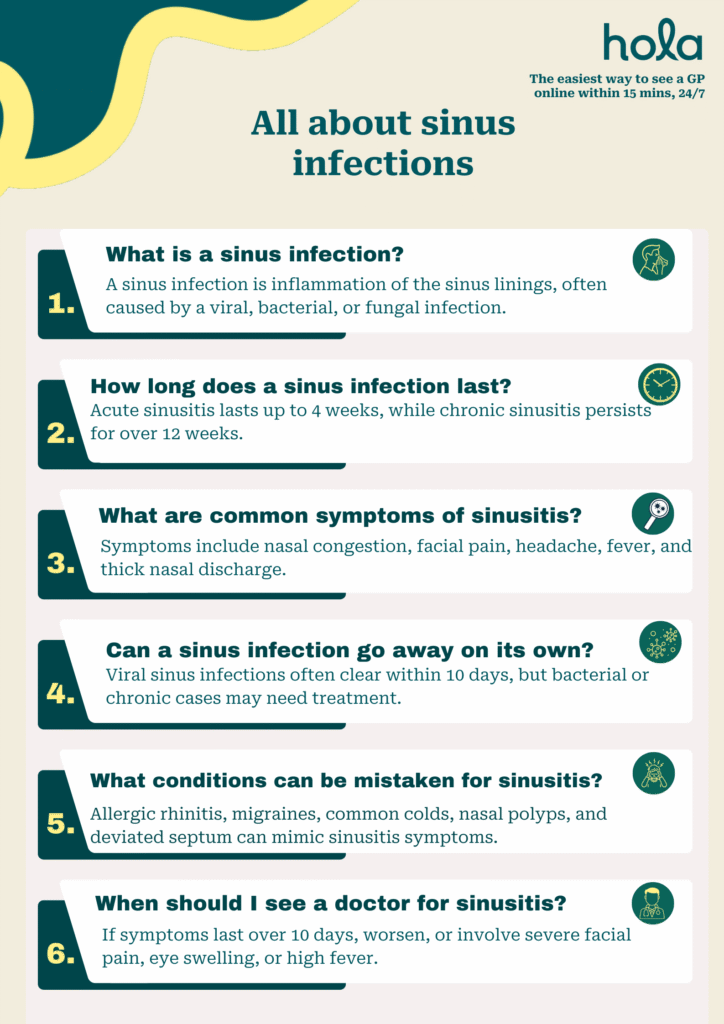Sinus infection (sinusitis): Symptoms & remedies
Written by the editorial staff writer at Hola. Medically Reviewed by Dr. Ammar AL-ANI, MBChB, CCBST, AMC.

Contents

Summary: Sinusitis arises from infections, allergies, or structural problems, leading to congestion, facial discomfort, and headaches. Diagnosis includes assessing symptoms, nasal endoscopy, or imaging studies. Mild cases can be managed with home remedies, while more severe cases might need antibiotics. Seek medical assistance for lasting symptoms, a high fever, or vision changes.
Sinus infection, also known as sinusitis, is an inflammatory condition where the cavities around the nasal passages become inflamed, often due to an infection. This inflammation can lead to various uncomfortable symptoms, including nasal congestion and facial discomfort. In Australia, sinusitis, both acute and chronic, is a prevalent issue in primary care, representing 1.4 visits in every 100 general practice appointments. Sinusitis can be acute, lasting for a short period, or chronic, persisting for weeks or even months. Understanding the symptoms and finding effective treatments is key to managing this common health concern. Let’s delve into the symptoms of sinusitis and present remedies to alleviate the discomfort it brings.
What is a sinus infection?
A sinus infection is an inflammation or swelling of the tissue lining the sinuses, the hollow cavities in the bones around the nose. It can occur when the sinuses become obstructed and filled with fluid, allowing germs (bacteria, viruses, or fungi) to develop and cause an infection. Sinus infections can be short-term, lasting for a few weeks, or long-term, lasting for several months.Types of sinus infections
There are four main types of sinus infections, classified based on their duration and the underlying cause:- Acute sinusitis: This sinus infection lasts for less than 4 weeks. It is often caused by a viral infection such as the common cold but can sometimes result from bacterial infections.
- Subacute sinusitis: A subacute sinus infection lasts between 4 to 12 weeks. It often develops after an acute sinus infection with inflammation enduring for an extended period.
- Recurrent acute sinusitis: An acute sinus infection is considered recurrent if it reoccurs 4 or more times a year, with each infection persisting for 7 days or more.
- Chronic sinusitis: Chronic sinus infections last more than 12 weeks, even with treatment. Persistent inflammation, bacterial infections, allergies, or structural problems in the sinuses can trigger it.
Symptoms and causes of sinusitis
Symptoms:
The symptoms of sinusitis can differ depending on the severity and duration of the condition, but common symptoms include:- Nasal congestion and blockage
- Facial pain or pressure
- Headache
- Coughing
- Fatigue
- Sore throat
- Fever
- Runny or stuffy nose
- Thick nasal discharge
- Bad breath
- Reduced sense of smell or taste
Causes:
Sinusitis is usually caused by factors that lead to inflammation or blockage of the sinuses. Common causes include:- Viral infections such as the common cold
- Bacterial infections
- Allergies
- Nasal polyps
- Environmental irritants
- Deviated nasal septum
Risk factors and complications
Several factors can increase the likelihood of developing sinusitis, including:- Upper respiratory tract infections: Common colds and viral infections can cause inflammation in the nasal passages and obstruct the sinuses.
- Allergies: Conditions such as hay fever can lead to nasal inflammation, resulting in sinus blockages.
- Nasal polyps: Growths within the nasal passages can prevent sinus drainage.
- Deviated nasal septum: An improperly aligned nasal septum can impede effective sinus drainage.
- Asthma: Frequently associated with chronic sinusitis, asthma can exacerbate inflammation in the airways and sinuses.
- Weakened immune system: Conditions like HIV, diabetes, or the use of immunosuppressive medications can elevate the chances of sinus infections.
- Exposure to pollutants: Smoking, environmental pollution, and chemical irritants can inflame the nasal passages.
- Frequent air travel: Fluctuations in air pressure can obstruct sinuses and heighten the likelihood of infections.
- Chronic sinusitis: Infections extending beyond 12 weeks, often necessitating long-term treatment.
- Orbital cellulitis: An Infection that spreads to the eye sockets, resulting in swelling, redness, and vision issues.
- Abscess formation: Collections of pus can develop in the sinuses or adjacent tissues, requiring drainage.
- Meningitis: A serious but rare infection in which bacteria spread to the protective membranes surrounding the brain.
- Osteomyelitis: An infection that moves to the facial bones or skull, particularly in children.
- Intracranial complications: Sinus infections may rarely lead to brain abscesses or blood clots within the brain.
- Reduced sense of smell: Ongoing sinus inflammation can damage the olfactory nerves.
- Breathing difficulties: Significant nasal congestion can lead to snoring or aggravate conditions such as sleep apnoea.
Feeling sick and unsure why? Speak with a GP online in 15 minutes.
Diagnosis
Sinusitis is diagnosed through symptom assessment, physical examination, and sometimes, specialised tests. Recognising the underlying cause aids in determining the most effective treatment plan:- Medical history and physical examination: The doctor will inquire about symptoms, duration, and potential triggers such as allergies or infections. A physical exam might include checking for tenderness in the face, nasal congestion, and nasal discharge.
- Diagnostic tests: Nasal endoscopy involves the insertion of a thin, flexible tube equipped with a light and camera into the nasal passages to inspect the sinuses. Imaging techniques like CT or MRI scans may be utilised for ongoing or severe cases to identify blockages, polyps, or complications. A nasal or sinus culture could be taken to identify bacterial, viral, or fungal infections, although this is not usually necessary. Allergy testing might be conducted if allergies are suspected as a contributing factor.
Lifestyle and home remedies
Implementing straightforward lifestyle modifications and employing home remedies can aid in alleviating sinusitis symptoms and support healing. These approaches can also help prevent recurrent infections:- Self-care measures: Consuming ample fluids assists in thinning mucus and keeping sinuses hydrated. Getting plenty of rest helps the body recover and combat infection. Utilising a humidifier or inhaling steam from a bowl of hot water can relieve nasal congestion and soothe inflamed sinuses.
- Nasal irrigation and decongestion: Flushing the nasal passages with a saline solution using a neti pot or squeeze bottle can aid in removing mucus and allergens. Applying warm compresses to the face may reduce sinus pressure and alleviate pain. Over-the-counter saline sprays or decongestants can offer temporary relief. Decongestant sprays should not be used for over three days to prevent rebound congestion.
- Allergy and environmental management: Avoiding dust, pollen, and pet dander can lessen sinus inflammation. Keeping the home tidy, utilising air purifiers, and evading exposure to smoke or strong odours can help maintain clear nasal passages.
What to expect from your doctor
During a telehealth consultation, the doctor will inquire about symptoms like nasal congestion, facial pain, headaches, and postnasal drip. They may ask about how long symptoms have been present, any past sinus infections, allergies, and recent illnesses. Based on their assessment, they might suggest home remedies or over-the-counter medications or prescribe medications if necessary. They may also recommend nasal rinses, adequate hydration, and steam inhalation for relief. If symptoms persist or worsen, the GP may arrange a follow-up or refer you for imaging tests or an evaluation by an ENT specialist.What can be mistaken for sinusitis?
Several conditions can exhibit symptoms similar to sinusitis, which may result in misdiagnosis. Accurately identifying the underlying cause of symptoms is crucial for effective treatment.Common conditions confused with sinusitis:
- Allergic rhinitis: Seasonal or environmental allergies can lead to nasal congestion, sneezing, and postnasal drip, resembling sinusitis.
- Migraines or tension headaches: Sinus pain and pressure are often mistaken for headaches, but migraines typically involve nausea, light sensitivity, and lack of nasal discharge.
- Common cold: Viral infections can result in congestion and facial pressure but usually resolve within 10 days without the extended inflammation characteristic of sinusitis.
- Nasal polyps or deviated septum: Structural problems can cause chronic congestion and breathing challenges, similar to symptoms of sinusitis.
Does sinusitis go away on its own?
Sinusitis can occasionally improve without intervention, contingent on the underlying cause and intensity.- Acute viral sinusitis: The majority of instances are due to viral infections, such as common cold, and usually resolve independently within 10 days. Home treatments like keeping hydrated, inhaling steam, and using saline nasal rinses can assist in alleviating symptoms.
- Bacterial sinusitis: If symptoms persist for over 10 days, aggravate after initial improvement, or involve intense facial pain and thick nasal discharge, it may indicate a bacterial infection. In these scenarios, antibiotics could be necessary.
- Chronic sinusitis: Sinus infections that last longer than 12 weeks often necessitate medical intervention, which may include nasal corticosteroids, allergy treatment, or, in certain situations, surgery.
How long does a sinus infection last?
The length of a sinus infection is influenced by its aetiology. Acute viral sinusitis usually lasts about 10 to 14 days and resolves without treatment. Bacterial sinusitis can last 10 days or more and may require antibiotics if it becomes severe. Chronic sinusitis lasts for 12 weeks or longer and frequently needs medical attention. Recurrent sinusitis happens several times annually, often due to allergies or nasal obstructions.
When to call the doctor
If symptoms of sinusitis persist beyond 10 days, worsen after a brief improvement, or frequently recur, it's important to consult a doctor. Seek medical help immediately if you experience severe facial pain, eye swelling, or high fever exceeding 102°F (39°C). Ongoing nasal congestion, thick yellow or green nasal discharge, or trouble breathing may also necessitate evaluation. Urgent medical attention is required if symptoms such as vision changes, confusion, a stiff neck, or intense headaches occur, as these may indicate a serious infection. Individuals with compromised immune systems, asthma, or chronic sinusitis should reach out to a doctor for appropriate care. Timely treatment can avert complications and encourage a quicker recovery.Telehealth for sinus infection
Telehealth makes it possible for people to discuss sinus infection symptoms with healthcare professionals from the comfort of their homes. Hola Health’s telehealth platform provides a practical and trustworthy solution for handling sinus-related concerns. Our services are available 24/7 and include:- Telehealth consultations: Patients can engage with skilled doctors to go over symptoms like nasal congestion, facial pain, headaches, and postnasal drip. The online doctor will evaluate the situation and offer expert advice on treatment and home remedies.
- Immediate instant script: If deemed necessary, healthcare providers can prescribe medications electronically. Patients may pick them up at local pharmacies or choose same-day delivery.
- Doctor referrals: For severe or ongoing sinus infections, GPs can refer patients for additional evaluation, imageing tests such as CT scans, or consultations with an ear, nose, and throat (ENT) specialist.
- Online medical certificates: If symptoms of a sinus infection interfere with work or daily life, Hola Health’s telehealth service can provide same-day medical certificate online or multi-day medical certificates as needed.
Preparing for online doctor consultation
Being well-prepared can help ensure a productive telehealth consultation regarding a sinus infection. Having the necessary information on hand enables the doctor to assess symptoms accurately and suggest suitable treatment:- Before the appointment: Compile a list of symptoms, how long they have lasted, and any factors that aggravate or relieve them. Record any previous sinus infections, allergies, or ongoing conditions. Gather details about current medications, including over-the-counter decongestants or antihistamines.
- During the consultation: Clearly describe symptoms, such as nasal congestion, facial pain, headache, and fever. Mention any recent colds or exposure to allergens. Inquire about treatment options, home remedies, and when to seek in-person care.
- After the appointment: Adhere to the prescribed treatment plan, which may include medications and lifestyle changes. Keep track of symptoms and seek follow-up care if they continue or worsen.
What we treat
- Cough
- Nausea & vomiting
- Fever
- Hayfever
- Fatigue
- Sore throat
- Acne
- Hair loss
- Gout
- Eczema
- Rosacea
- Sunburn
- UTI
- Erectile dysfunction
- Contraception
- Morning sickness
- Morning after pill
- Prostate health
- Anxiety
- Depression
- Stress
- Grief & loss
- Antidepressants
- Premature ejaculation
- Asthma
- Blood pressure
- Blood thinners
- Diabetes
- Cholesterol
- Migraines & headaches
- Allergies
- Body ache
- Heartburn & reflux
- Sleep disorder
- Pain relief
- Gastro
Related Articles
Disclaimer
This blog is for general informational purposes only and does not indicate that Hola Health provides all treatments or preventive measures mentioned. It is not intended to be a substitute for professional medical advice. Always seek the guidance of your doctor or other qualified health professional with any questions you may have regarding your health or a medical condition. For emergencies please immediately contact 000. Any medical topics discussed are intended to educate, not to imply availability through Hola Health.

Get affordable healthcare on your terms, with quick access to qualified, Australian-registered telehealth doctors & health practitioners, 24/7, 365 days a year. No more searching for ‘doctors near me‘ – Hola connects you instantly.
Address: 79 St Georges Terrace, Perth WA 6000


Hola Health App
Get affordable healthcare on your terms, with quick access to qualified, Australian-registered telehealth doctors & health practitioners, 24/7, 365 days a year. No more searching for ‘doctors near me‘ – Hola connects you instantly.
Call 000 for emergency or urgent medical help.
Address: 79 St Georges Terrace, Perth WA 6000
© Hola Health, a brand of Packapill Pvt Ltd


 Facebook
Facebook  X
X  Copy Link
Copy Link











